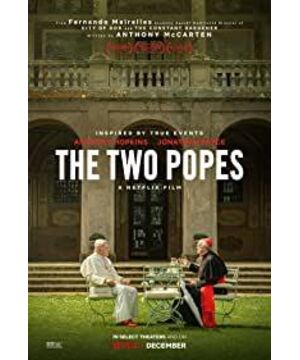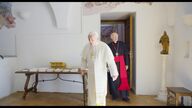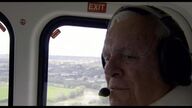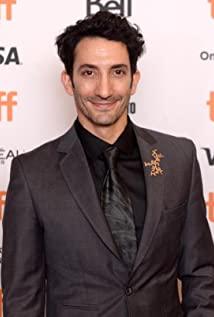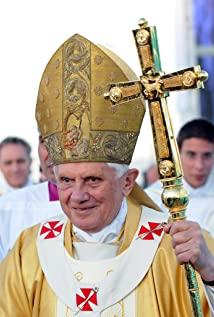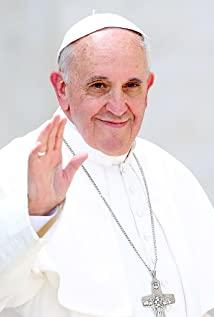01
The collapse of belief, the disenchantment of divinity, and the liberation of human nature, along with the exploration and popularization of science, religions that firmly control traditional ideology are being ignored and abandoned by many younger generations. Although Catholicism still has more than one billion believers, the soil enlightened by modern consciousness is obviously not enough to support it to continue to take root and expand in the original way.
"The Pope's Succession" records the entire process of Pope Benedict XVI's resignation. This dramatic story is not made up but a real event. Behind the unseen situation in 600 years, it is the conservative inside the Catholic Church. The game between factions and reformists. Benedict XVI represents the traditional forces within the church. In the face of external doubts and the rise of relativism, he exercises the power of saying "no" as a pope, while on the other hand, Bishop Bergoglio acts as a Reformers, deeply helpless about the current state of the church, offered to resign. In the deep wall, Benedict XVI and Bergoglio discussed and debated the future development of the church. The former believed that as believers of the church, they should follow the established creeds of hundreds of years, which should not be challenged and questioned ; while the latter believes that we should not use dogmatic provisions to build a wall separating modern consciousness from religious belief.
However, under the oppression of internal and external troubles, theocracy needs to make a choice between passive compromise and active change.
02
Overturn a wall, build a bridge
Entering the new world, the vigorous development of modern society is mostly attributed to scientists, engineers, and individuals struggling in different positions. In the past, many things were believed to be accomplished only by God, but now they have language definitions and practical practices. As a result, the allegorical and mist-shrouded theocracy is deconstructed by positivist philosophy, and the atheists, who are seen as pagans, have legitimate reasons to question the theocracy-held past and the future theocracy is building. However, while this kind of enlightenment or awakening in thinking poses a threat to religion, it also welcomes counterattacks from religious believers and religious spokespersons.
In "The Pope's Succession", Benedict XVI showed his unabashed desire to win from the very beginning, and in the process of canvassing, he firmly stated his position, and he saw the Church in today's world. He is still unwilling to see the congregation abandon the principles that the church should abide by, and stubbornly believes that they only need an axis for believers to refer to, and an eternal truth. Religious traditions have lasted for thousands of years. They are written in classics through stories and fables for everyone to refer to. Whether it is a few words or a long speech, the dogma has become the skeleton of theocracy, and the beliefs and worship of the people are filled in it. Therefore, God is no longer free and ethereal, but builds fortresses and walls in the material world and consciousness space of believers. But in the course of history, some people escaped from it, and some people were persecuted because of it, they looked up to peek into the world outside the wall, and through observation and experimentation, they overturned many documented dogmas. This is the ultimate contradiction within the wall, that is, the dogmas bound to theocracy are not irreversible, because these overturned dogmas are not truths bestowed by God, but lies woven by man.
Benedict XVI refused to overthrow such a wall, and like a dictator, he refuted those who held heretical opinions, although these opinions were an inevitable product of the development of modern society. He chose to cover up and tolerate the scandals that occurred within the church, and refused to admit that theocracy was out of control. However, in the face of many practical problems such as environmental pollution and the widening gap between the rich and the poor, as the closest person to God, he did nothing. Even turning a blind eye to it is a kind of arrogance, and theocracy will also lose the piety and humility of believers. Bergoglio does not want to see theocracy surrounded by high walls, it should have a more open expression and a wider interpretation, and it should participate in the lives of everyone with a more active attitude to prove its own existence and Vitality, it needs a bridge to regain the trust and conversion of the people.
03
Does "God" Really Exist?
Of course, as long as you see the union of the divine and the human
Compared with Benedict XVI's adherence to traditional teachings, Bergoglio was more flexible in this regard. He saw that the so-called dogma also had a process of change and progress, and also saw the disconnect between theocracy and the real world. The practice of using "walls" to isolate heretics has lost its binding force in the past when the minds are becoming more and more open and diverse. No matter how strong and hard the wall is, it cannot prevent people from jumping and escaping from it. Bergoglio also realized that religion needs to break down the internal barriers to regain people's ideological high ground, and in this context, "God" will be more specific and essential, because it is mixed with into the individuality and commonality of people.
Bergoglio was not a religious person from the very beginning. He had also faced the choice of joining or not joining. In the end, it was the power in the shadows that guided him to choose the former. The footprint left by the way in his life, it does not come from the material world, and there is no physical body to touch. Does God really exist? After such an encounter, Bergoglio no longer doubted, even though he was not wise enough at the time to understand the full meaning of "God". Until he faced the coup d'état, faced persecution, and faced death, he witnessed the death of many priests and believers, but "God" did not lend a helping hand or save their lives. Where is "God"? When his life was threatened at all times, he did not dwell on the answer to this question. Instead, he took active actions and tried his best to save the lives of the remaining believers. At that moment, what he was doing was not the work that God should have done. I think that the person who motivated him to act in this way is the embodiment of "God".
Fear, kindness, fraternity...
It was with these full emotions that Bergoglio carried out his plan to save everyone, and it was not until he experienced this that he realized that "God" cannot exist without people. In reality, it is not based on myths. The gesture of a protagonist in the novel comes to the world, but it contributes to the solution of the problem by giving people a certain emotion. In this sense, "God" does indeed exist, and it represents the most precious character in the human world. These are recorded in the classics, but only people can activate them. That is to say, the foothold of God is human, the divine nature. After all, it is necessary to combine with human nature to obtain the vitality that affects reality, and to realize this requires wisdom, imagination, and even more experience.
04
Change comes from people's hearts, and should also go to people's hearts
Under the pressure, Benedict XVI finally chose to abdicate, and he also expected that Bergoglio would become the new pope in the next election. As the latter said, this is not a compromise, but a change, and the voluntary abdication of Benedict XVI represents the determination made by him and the religious group behind him, and he chose to believe in the future vision outlined by this reformer.
At the beginning of the film, Bergoglio said: Reform needs politicians. It's a rather pragmatic idea, as it looks at the real problems faced by believers all over the world. As a bishop from the third world, Bergoglio's election itself has quite far-reaching political significance. He is a bishop from the poor world, and he is rightly placed in the poor of the faithful, because these poor class believers Both long for a religion that tilts the resource-laden scales toward the poor, rather than making it a playground for the rich to entertain and repent. In Bergoglio's view, change comes from people's hearts and should also go to people's hearts. People's hearts constitute the divine power behind religion. It should not lie in a high wall to bathe in the sun, but it needs to give back to everyone with concrete actions. of faith and pilgrimage, it should be committed to resolving conflicts between different civilizations to consolidate longer-term peace, it should also pay attention to the terror and poverty brought about by war, and it should always stand with people to deal with the oppression and poverty they suffer. unequal.
If religion wants to manifest its existence in a more active way, it needs to do something, and it needs to solve many problems that exist in reality. All a conservative leader can accomplish is to repair the wall that may collapse at any time, and the person who knows how to listen will become the ear of "God", listening to the suffering that is happening in the world, and act with the resources at his disposal to achieve people's demands.
I think what Bergoglio did was not to separate himself from "God" in the traditional sense, but to present "God" in a more concrete and practical form to the public in order to dig out the humanity behind theocracy.
"The Pope's Inheritance" tells about the collision of views and the choice of positions between the two generations of Popes Benedict XVI and Bergoglio. The conservative attitude that is incompatible with reality has caused the Pope himself and the Holy See to be questioned and criticized by the outside world. This led to an alternative transition of the papacy.
In what way should religion be integrated into the development process of modern society, the film and the reality recorded by the film have given an answer that is happening.
View more about The Two Popes reviews


